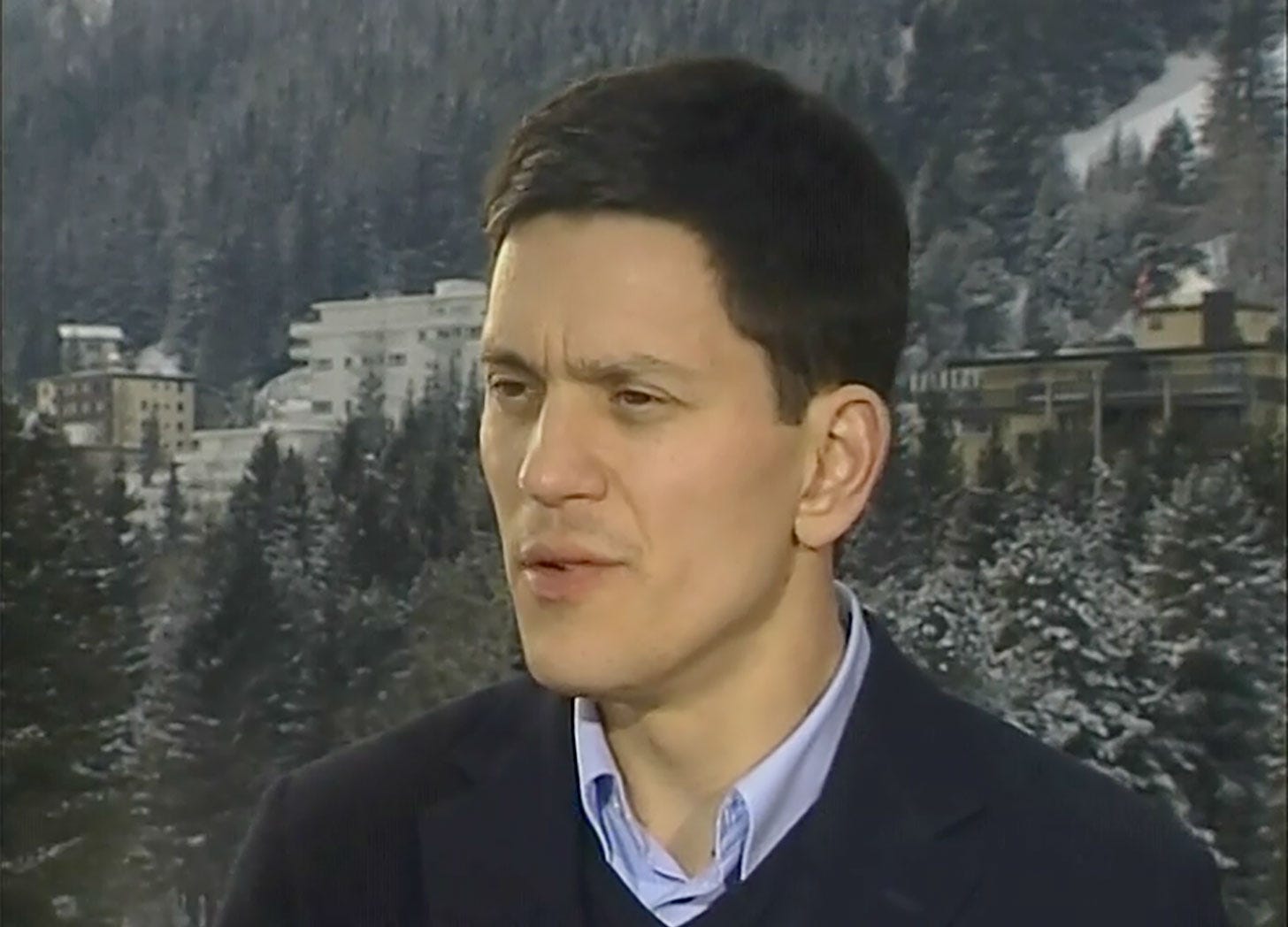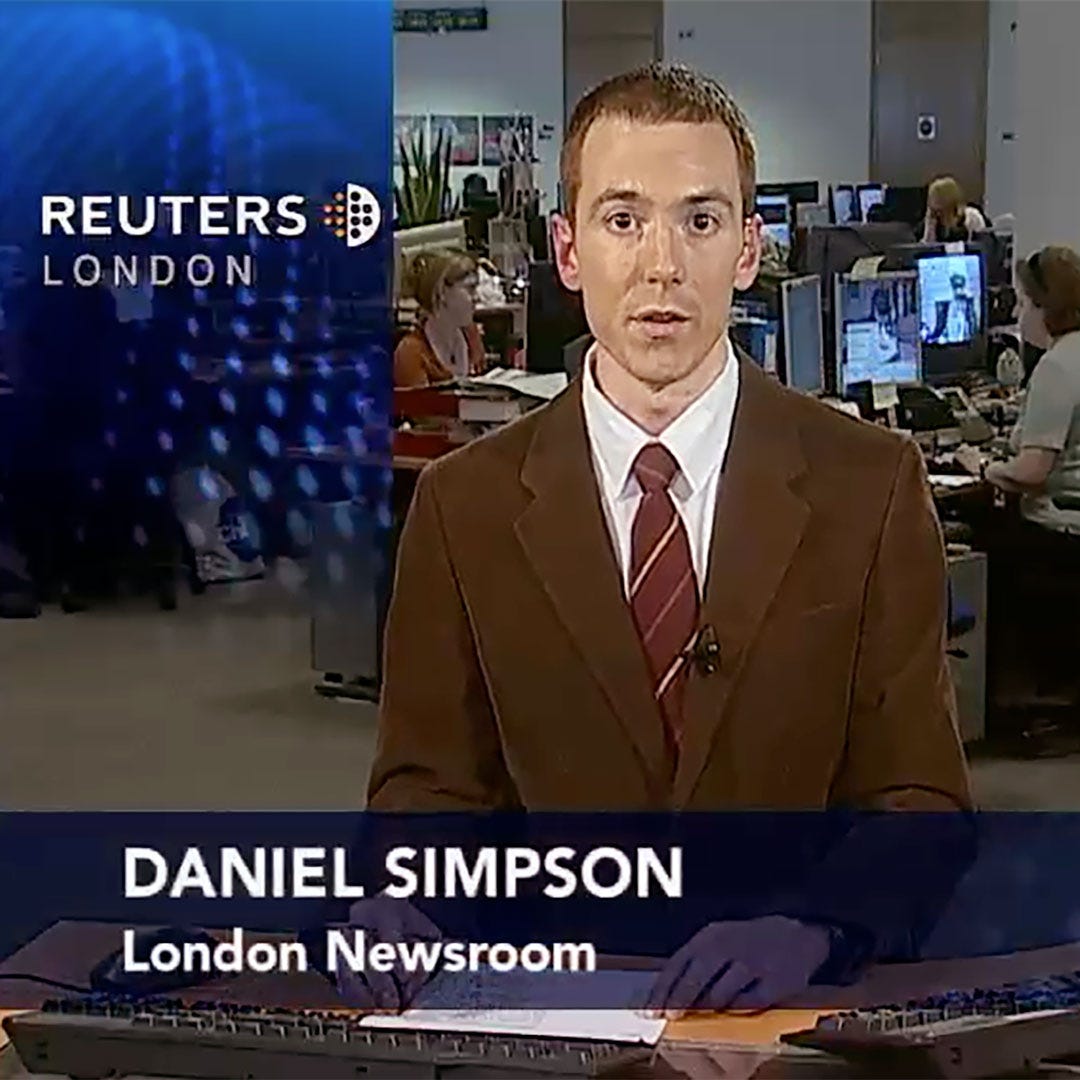For a few months in the Noughties (a.k.a. the Aughts), I worked as a TV producer at Reuters. One of the perks of the job was a workaholic ski trip, trawling for interviews with globalist influencers in the Swiss Alps.
The Annual Meeting of the World Economic Forum – cordoned off by police in the resort of Davos-Klosters – is a weird sort of networking party for executives, wonks and officials. The schedule features panels of TED-talky patter from people who use the term “thought leader” without wincing. But most of the action is elsewhere, from glad-handing in corridors to covert assignations with freeloaded booze.
In short, it is the sort of place where someone ambitious can make the right contacts to land themselves a sinecure at the United Nations, or any international organisation. And in the meantime, they might talk to journalists to help raise their profile.
Therefore, when I attended in 2007, one of the few to respond to my calls was David Miliband – at the time, the UK’s Secretary of State for Environment, Food and Rural Affairs, but now boss of the International Rescue Committee, on annual pay of more than $1 million.
While “World leaders confront ‘The Shifting Power Equation’,” to quote the WEF’s sales pitch – with cameos from Bono and Prince Andrew – the likes of Miliband lined up to opine on our open-air platform. Others included Kamal Nath, the Indian trade minister, and the U.S. Secretary of Homeland Security, Michael Chertoff.
But it’s Miliband who sticks in my memory. His on-camera exchange with my boss – to whom I handed lists of questions – ended awkwardly. “Can I edit something out?” Miliband asked. “There’s something I said which I don’t want misused.”
He didn’t elaborate. My boss reassured him that we just wanted quotes for a package on climate change (implying no need to worry about being shafted). But reviewing the tape, I found this: “If you use renewable energy, if you use renewable fuels and you are saving your carbon emissions, then you can have as many flights as you like.”
Since Reuters sells footage to broadcasters, I suggested feeding his faux pas to London, perhaps for inclusion on Channel 4 News. I spliced the clips together and played them to colleagues. “Did he say that?” one gasped, then forgot about it. I did too. We all had other priorities – in my case, preparing for the next day’s chats with the founder of the World Toilet Organisation and the spiritual author Paulo Coelho. Still, here it is…
What strikes me in hindsight is not his desire to correct his mistake, but the body language. Miliband takes a step forwards, asserting control, while my boss’s nervous “Mmmmmm” suggests grudging compliance. Trivial as it sounds, this sort of subtle dynamic helps manipulate news – in a one-way “gentleman’s agreement” based on fears about future exclusion from elite circles.
I recall being played in an earlier job by an American ambassador, who barked “you’re really starting to piss me off” when I asked probing questions. I apologised profusely, afraid I’d ruin my career as a foreign correspondent if diplomats blackballed me. After all, my employer, The New York Times, was “the indispensable newsletter of the United States’ political, diplomatic, governmental, academic, and professional communities,” to quote its then editor.
At the WEF, the unspoken agenda is increasing corporate power, through what its founder Klaus Schwab calls “stakeholder capitalism”. By trumpeting a “Great Reset” of the global economy after COVID-19, Schwab and his forum have become the latest lightning rods for conspiracist panic about a “new world order” that seeks to enslave us and depopulate the planet. Yet even if those outcomes transpire, the WEF is not the world’s secret government. It’s just a talking shop where suits trade ideas.
That’s not to say there aren’t conspiracies. Miliband helped to perpetuate one a few months later after being promoted to Foreign Secretary – appealing against a ruling that the UK had illegally expelled the Chagos islanders in the 1960s to allow the U.S. to build a military base on Diego Garcia. Although courts kept upholding their right to return, Miliband sought to ban them while defending government by decree.
Davos Man in Action
Few people have strong enough convictions to avoid being moulded by institutions. I wrote a lengthy article about the Chagos crime before my brief stint at Reuters, where I kept emailing editors about bias towards Western officials and corporations. Yet the only time I spoke in the morning news-planning meeting, suggesting a feature on the latest Chagos case, I got quizzical looks and piped down fast.
An old journalistic adage holds that news is what the powerful want buried and the rest is advertising. Like the notion that one comforts the afflicted while afflicting the comfortable, it helps to convince reporters that their role is adversarial. It might be in some ways, of course, but most news is framed with the views of the powerful.
A more liberating model could integrate Reuters and the WEF. If there were a global network of agencies, wholesaling corporate and government news, other outlets could just leave them to it and focus instead on investigations. But since few of us want to watch “the propaganda channel”, or read “all that serious stuff”, what we get is a mixture of everything – led by gossip and clickbait – and self-delusion prevails.
Despite my pretence to have seen through the matrix, I defended it in Davos. When a Mexican cameraman tried to gatecrash our colloquy with Paulo Coelho, I felt weirdly territorial and pushed him away. He squared up for a fight and the writer intervened. Interrupting his interview, he urged me to relax.
Beneath his clipped goatee, Coelho wore a sharp black suit and matching roll-neck. “When you want something,” he wrote in The Alchemist, “all the universe conspires in helping you to achieve it.” He asked me for a cigarette. Having recently quit, I wanted to tell him that by his age he should either be an addict who carried his own, or stop fooling around. Instead, I said “I don’t smoke” and felt ashamed.
My career ended in ignominy shortly afterwards. I’d resigned before going to Davos, and was working my notice. On my return, I faxed a few ideas about ways to help the Chagos islanders to the Conservative leader David Cameron and his shadow Foreign Secretary William Hague. Since I’d done this from an office machine on headed paper, one of their assistants immediately called Reuters to ask who was lobbying them.
I was told to clear my desk and leave the building. “What were you thinking?” asked the managing editor. I wasn’t – I acted on instinct. I didn’t seek to cause problems for Reuters. I just thought I’d get an answer if I borrowed their stationery. I wanted to do something useful, and in the process showed a lack of concern for their reputation. I thought they’d been doing that themselves for a long time, but it was still no excuse.
I suppose if I’m honest, I wanted to be seen to be doing something useful, regardless of the impact. And what could be more Davos than that? 🤷♂️
If you enjoy what you find here, and feel like buying me a drink, click the button below… All donations are greatly appreciated!






What an interesting post, full of experiences that might take years to process fully It raises lots of questions like why share the Milliband clip now after all this time? There's an obvious timeliness to it I guess in the counterpoint with current disclosures. It's interesting to reflect on how the act of resignation in all its senses, liberates the self to act in ways that might have felt unimaginable at an earlier time; and how organisations assert a collective identity and hold/bondage over the individuals who are part of them. It also raises reflections on the cost of being a reporter who is restricted from doing their job and how this can and will erupt in 'the right circumstances'. I could go on...........thanks for sharing!